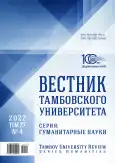Distance learning of foreign languages: current state and ways of improvement in the context of increasing motivation and developing students' autonomy
- Authors: Aleksich E.V.1, Hausmann-Ushkova N.V.2, Pervova G.M.2
-
Affiliations:
- Kikot Moscow University of the Ministry of Internal Affairs of Russia
- Derzhavin Tambov State University
- Issue: Vol 27, No 4 (2022)
- Pages: 898-910
- Section: THEORY AND METHODS OF FOREIGN LANGUAGE TEACHING
- URL: https://journal-vniispk.ru/1810-0201/article/view/298265
- DOI: https://doi.org/10.20310/1810-0201-2022-27-4-898-910
- ID: 298265
Cite item
Full Text
Abstract
Various aspects of the problem of distance learning of foreign languages in higher educational institutions in the context of informatization of domestic education are considered. A critical review of the current state of the problem under discussion is presented, the accumulated practical experience is summarized. Special attention is paid to how the distance format affects the change in the nature of communication between students and between a teacher and a student, as well as how the role of reflection increases in the improvement of various aspects of teaching foreign languages. The specifics of the conceptual apparatus and scenarios of interaction of participants in the educational process in the implementation of distance learning technologies are considered, their strengths and weaknesses are highlighted. Based on the reasoning about how electronic educational platforms are changing the modern educational reality in general and teaching foreign languages in particular, important observations related to the competence of this teacher and conclusions about the need to develop a distance education system capable of making the learning process lively and authentic are made.
About the authors
E. V. Aleksich
Kikot Moscow University of the Ministry of Internal Affairs of Russia
Email: e.aleksic@mail.ru
ORCID iD: 0000-0001-8842-3160
Candidate of Pedagogy, Associate Professor of Foreign Language Department
12 Academician Volgin St., Moscow 117437, Russian FederationN. V. Hausmann-Ushkova
Derzhavin Tambov State University
Email: nush2001@mail.ru
ORCID iD: 0000-0002-4347-624X
Doctor of Philology, Associate Professor, Professor of Linguistics and Linguodidactics Department
33 Internatsionalnaya St., Tambov 392000, Russian FederationG. M. Pervova
Derzhavin Tambov State University
Author for correspondence.
Email: gmp47@yandex.ru
ORCID iD: 0000-0002-5777-2832
Doctor of Pedagogy, Professor, Professor of Theory and Methodology of Preschool and Primary Education Department
33 Internatsionalnaya St., Tambov 392000, Russian FederationReferences
- Evstigneyev M.N. Kompetentnost’ uchitelya inostrannogo yazyka v oblasti ispol’zovaniya distantsionnykh tekhnologiy na sovremennom etape [Competence of a foreign language teacher in the field of using distance technologies at the present stage]. Inostrannyye yazyki v shkole – Foreign Languages at School, 2020, no. 9, pp. 80-90. (In Russian).
- Vygotskiy L.S. Pedologiya podrostka. Psikhologicheskoye i sotsial’noye razvitiye rebenka [Pedology of a Tee-nager. Psychological and Social Development of the Child]. St. Petersburg, Piter Publishing House, 2021, 224 p. (In Russian).
- Stepanova N.A. Sushchnost’ formiruyushchego kontrolya i ego rol’ v obuchenii inostrannomu yazyku [The essence of formative assessment and its role in the foreign language teaching]. Vestnik Tambovskogo un-iversiteta. Seriya: Gumanitarnye nauki – Tambov University Review. Series: Humanities, 2021, vol. 26, no. 192, pp. 70-77. https://doi.org/10.20310/1810-0201-2021-26-192-70-77. (In Russian).
- Titova S.V., Barinova K.V. Refleksiya v onlayn-obuchenii inostrannym yazykam v shkole: podkhody, spo-soby, mekhanizmy realizatsii [Reflection in online foreign language teaching at school: approaches, methods, mechanisms of implementation]. Inostrannyye yazyki v shkole – Foreign Languages at School, 2020, no. 9, pp. 29-37. (In Russian).
- Lesin S.M., Makhotin D.A., Mikhaylov V.Y. Distantsionnoye obucheniye v shkole: klyuchevyye ponyatiya [Distance Learning at School: Key Concepts and Problems]. Inostrannyye yazyki v shkole – Foreign Languages at School, 2020, no. 9, pp. 5-14. (In Russian).
- Polat E.S., Bukharkina M.Y., Moiseyeva M.V. et al. Teoriya i praktika distantsionnogo obucheniya [Theory and Practice of Distance Learning]. Moscow, Akademiya Publ., 2004, 416 p. (In Russian).
- Fandey V.A. Smeshannoye obucheniye: sovremennoye sostoyaniye i klassifikatsiya modeley smeshannogo obucheniya [Blended learning: current state and classification of blended learning models]. Informatizatsiya obrazovaniya i nauki – Informatization of Education and Science, 2011, no. 4 (12), pp. 115-125. (In Russian).
- Aleksich E.V., Stromov V.Y. Preduprezhdeniya deviatsiy v seti Internet kak usloviye obespecheniya informat-sionnoy bezopasnosti studentov vuza [Preventing deviations on the Internet as a condition for ensuring universi-ty students’ information security]. Mezhdunarodnyy zhurnal psikhologii i pedagogiki v sluzhebnoy deyatel’nosti – International Journal Psychology and Pedagogics Official Activity, 2020, no. 2, pp. 15-18. (In Russian).
Supplementary files








